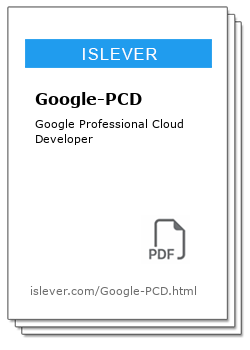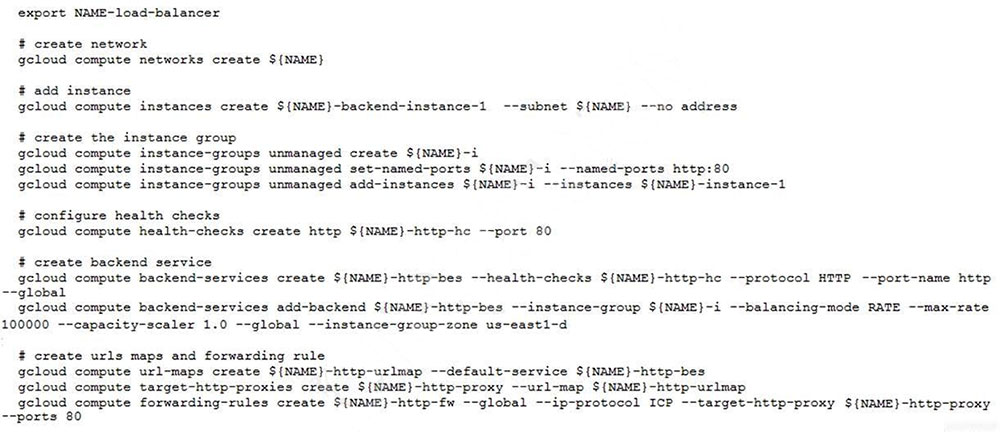Description

Exam Google-PCD: Google Professional Cloud Developer
|
Unlock the Shortcut to Quick Exam Success with Google-PCD Mock Tests! Tried and tested by countless students, our Google-PCD Tests are your express ticket to acing the Google-PCD exam. Packed with the latest exam questions and answers, these study materials are designed to save you precious time and energy. Say goodbye to the stress of exam preparation and hello to your coveted certification. Our study materials come in PDF format, featuring a comprehensive collection of exam questions. Google Professional Cloud Developer. Master these questions, and you're well on your way to passing the exam with flying colors. |
DEMO
Question #1
You want to upload files from an on-premises virtual machine to Google Cloud Storage as part of a data migration. These files will be consumed by Cloud
DataProc Hadoop cluster in a GCP environment.
Which command should you use?
- A. gsutil cp [LOCAL_OBJECT] gs://[DESTINATION_BUCKET_NAME]/
- B. gcloud cp [LOCAL_OBJECT] gs://[DESTINATION_BUCKET_NAME]/
- C. hadoop fs cp [LOCAL_OBJECT] gs://[DESTINATION_BUCKET_NAME]/
- D. gcloud dataproc cp [LOCAL_OBJECT] gs://[DESTINATION_BUCKET_NAME]/
Answer: A
Question #2
You migrated your applications to Google Cloud Platform and kept your existing monitoring platform. You now find that your notification system is too slow for time critical problems.
What should you do?
- A. Replace your entire monitoring platform with Stackdriver.
- B. Install the Stackdriver agents on your Compute Engine instances.
- C. Use Stackdriver to capture and alert on logs, then ship them to your existing platform.
- D. Migrate some traffic back to your old platform and perform AB testing on the two platforms concurrently.
Answer: C
Question #3
You are planning to migrate a MySQL database to the managed Cloud SQL database for Google Cloud. You have Compute Engine virtual machine instances that will connect with this Cloud SQL instance. You do not want to whitelist IPs for the Compute Engine instances to be able to access Cloud SQL.
What should you do?
- A. Enable private IP for the Cloud SQL instance.
- B. Whitelist a project to access Cloud SQL, and add Compute Engine instances in the whitelisted project.
- C. Create a role in Cloud SQL that allows access to the database from external instances, and assign the Compute Engine instances to that role.
- D. Create a CloudSQL instance on one project. Create Compute engine instances in a different project. Create a VPN between these two projects to allow internal access to CloudSQL.
Answer: A
Question #4
You have deployed an HTTP(s) Load Balancer with the gcloud commands shown below.

Health checks to port 80 on the Compute Engine virtual machine instance are failing and no traffic is sent to your instances. You want to resolve the problem.
Which commands should you run?
- A. gcloud compute instances add-access-config ${NAME}-backend-instance-1
- B. gcloud compute instances add-tags ${NAME}-backend-instance-1 --tags http-server
- C. gcloud compute firewall-rules create allow-lb --network load-balancer --allow tcp --source-ranges 130.211.0.0/22,35.191.0.0/16 --direction INGRESS
- D. gcloud compute firewall-rules create allow-lb --network load-balancer --allow tcp --destination-ranges 130.211.0.0/22,35.191.0.0/16 --direction EGRESS
Answer: C
Question #5
Your website is deployed on Compute Engine. Your marketing team wants to test conversion rates between 3 different website designs.
Which approach should you use?
- A. Deploy the website on App Engine and use traffic splitting.
- B. Deploy the website on App Engine as three separate services.
- C. Deploy the website on Cloud Functions and use traffic splitting.
- D. Deploy the website on Cloud Functions as three separate functions.
Answer: A
Question #6 ... 285
Google Professional Cloud Developer
Note: The Google-PCD DEMO includes only a small portion of the actual product content. To access the complete material, please consider purchasing the product. Upon purchase, you'll receive a PDF file containing the entire content.
Additionally, our Google-PCD brain dumps has been curated to exclude outdated, invalid, and erroneous information, ensuring a more effective learning experience for you.